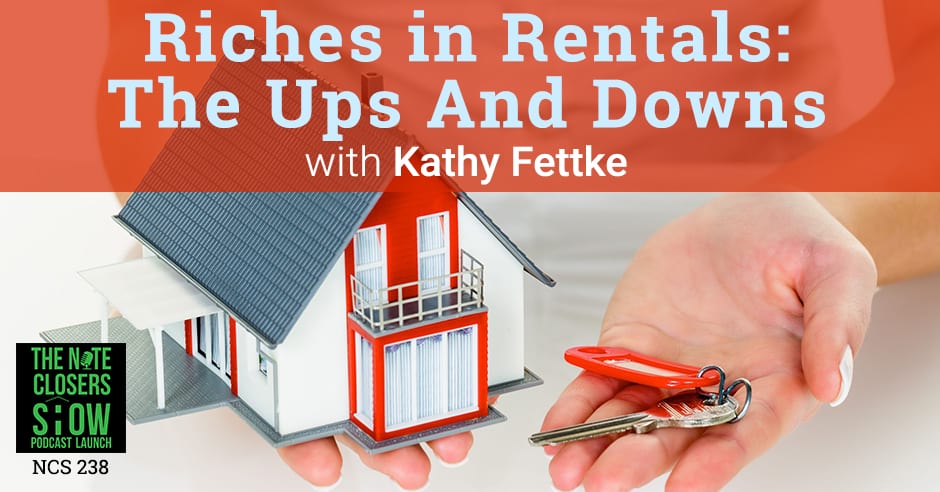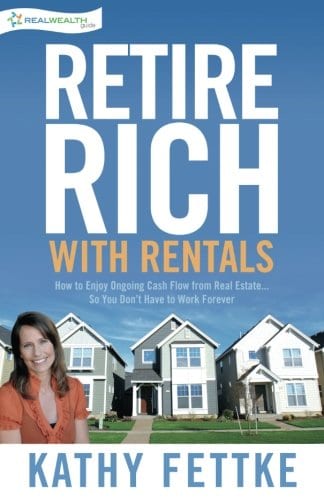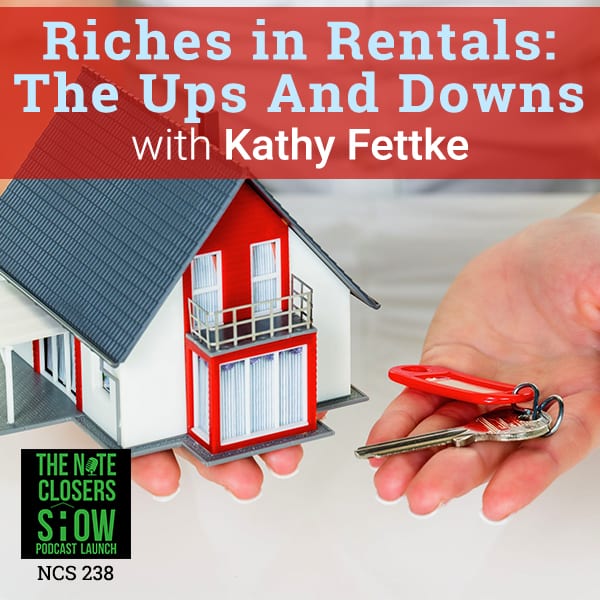
Knowing what’s coming up next in the market is a mindset every real estate investor should have. This is what keeps CEO and founder of Real Wealth Network Kathy Fettke ahead of the curve that led her to the keys to riches in rentals. Kathy shares her experiences in looking for places with bad reputations and how it forced her to know the “why” in every opportunity. Because this “why” is usually an inexpensive step to growth. She also shares the mistakes she made as she worked on her real estate portfolio and how she overcame these mistakes.
—
Listen to the podcast here
Riches in Rentals: The Ups And Downs with Kathy Fettke
I’m jacked up to have a legend with us on the show, a woman who knows her business inside and out, who’s done a tremendous job not only in her own real estate business but helping thousands of other people to take advantage of the market, do some big things, and change their destiny. Good morning, Kathy. We’re so excited to have you here. Thanks for joining us.
Good morning.
For those who don’t know who Kathy is, she’s a CEO and Founder of Real Wealth Network and the host of The Real Wealth Show. She’s an active real estate investor, licensed real estate agent, certified coach, and a former mortgage broker. She specializes in helping people build multimillion dollar real estate portfolios for creative financing and planning. She was recognized as one of Goldman Sachs 100 Most Intriguing Entrepreneurs two years in a row, and is frequently featured on media such as CNN, Fox News, CNBC, NPR, CBS, MarketWatch, and the Wall Street Journal. What’s your bread and butter when it comes to real estate? What do you absolutely love about that aspect of investing?
I have this thing for wanting to know what’s next, what’s coming, get there before everybody else. It could be that I was born and raised in Menlo Park. I hung out at the same coffee shops as Steve Jobs. I was right there amid all that tech growth. I love being in front of the curve. When I discovered this wonderful world of real estate that I didn’t know anything about except my mom and dad would buy a house, live in it, and make a million bucks, I saw it as a way to make equity and become a millionaire. My husband was a dentist and one might think that’s how he would make money, but it was true accidental real estate in California. That was my only impression of it. Once I started to learn all the different ways that wealth could be built, mostly because I was a mortgage broker and could see the power of leverage, that’s what got me hooked. I was so fortunate to have a radio show in San Francisco that my husband turned into a podcast that no one had heard about. The day that it came out on iTunes, he’s like, “Let’s put your show on this thing.” Overnight, I had listeners worldwide because we were one of the first and only podcasts. I got to interview really experienced people, people with far more experience than me. I was new. I didn’t know very much about real estate, but I got to learn from these giants. One of them being Kiyosaki, who taught me that California was in a bubble, what to look for, how to know, and that Texas was not whatever you call the opposite of a bubble, an under bubble. It was 26% undervalued there. He showed me that if you could sell at the peak in California and buy at the trough in Texas where everybody thought it was the craziest thing in the world buy in Texas, nothing happens in Texas but we followed him, he knew what he was doing, and we’re ahead of the curve there. A lot of people followed that advice, sold at the peak. We helped them buy in Texas. They never felt a recession. They didn’t know there was one because we didn’t feel it.
We’re pretty blessed here in Texas that we didn’t have such a huge appreciation. We stayed level at 5%, 10% on average even through the worst times. Austin in itself here is a little bit different. We call it California East because there are so many people doing the same thing. They’re cashing out their California properties, move in here and buy three times the size of the house they got in California instead of putting millions of dollars in their bank deposits and save that and being able to use to leverage it smartly. What are some of the key factors that you’re looking at in different markets to help you identify the next Austin or the next market?
Fast forward fourteen years, we’re seeing a lot of the same things that California has back past its last peak. Dallas has gone up. A lot of Texas values have gone up. Where’s that next place where you can sell your high-priced California property or Dallas property or Denver or Seattle, and go and get really good cash flow? All along we’ve looked for these places that have a bad reputation, so to speak. People are afraid of them because they don’t know what’s happening. They know what used to be. We had over 300 people at our last event and I said, “How many of you have been to Pittsburgh?”One or two hands went up. I said, “What do you think Pittsburgh looks like?”They’re like, “It’s a dirty city. All this steel.”I said, “They haven’t really been doing this steel thing for a while.”People don’t know that Pittsburgh is one of the cleanest, greenest cities now. It has the biggest LEED certified building there. They’re leading the way on LEED. You wouldn’t know that. When I’m in LA and I say, “Did you happen to know that Pittsburgh is second to LA in film production? That may be changing to Atlanta but there’s a lot of film production there.”No, they don’t know that. “Did you know that Google’s East Coast headquarters are there?” No. We want to know these stuff before anybody else so we can buy all the good deals first.
There are all these second-tiered cities versus the big ones that everybody thinks about. The lower part of the top 50 that are really great investment cities have a lot of regentrification going on where industries changed there in the last ten, fifteen, twenty years. Pittsburgh and Philadelphia cities are great examples of that. I love your book because you spelled out and keep it simple for people that rock and roll on things. Would you mind sharing a little bit of how important it is to have a real valuable ‘why’? In the first chapter, you outlined it. You want to talk a little bit about that?

Riches In Rentals: You’ve got to know your ‘why’. Once you have that, everything else falls in line.
You need a ‘why’ for everything. Just an example is my wedding with Rich. We had to pay for it ourselves. You had to come down to what’s the most important thing we want from this wedding. Do we want people to have the best food in the world or the best wine or just the most fun? We decided the most fun was the cheapest. We went with that and we got Two Buck Chuck, and we had a great time. You’ve got to know your ‘why’. Once you have that, everything else falls in line because the ‘why’ is usually not very expensive. That’s the piece people are missing. They think that money is going to bring them happiness, when it’s really the things that don’t cost a dime that bring you happiness, although having money can bring you more fun. When Rich and I had no money, we would go camping with the family at free campsites and have so much fun. The kids probably liked those trips more than Hawaii and Europe because back when we had no money, we still had a good time.
In our case, back in 2003, Rich was told he had melanoma. He had been a bodybuilder. He would fry his red head and his white skin. He would fry it to a crisp like he was Italian. He would get very tan. I remember saying, “That’s probably carcinogenic.” I didn’t know him back then. He’s like, “There’s no research on that.” I’m like “You’re going to be the research.”Sure enough, he had melanoma and cut it out. The doctor said, “It looks like it’s spread. If it did, you have six months to live.”There’s a big ‘why’ they’re like, “You stay home with the kids. You do whatever you want. I will take over the finances and I’ll figure it out.”Even though I had been a stay-at-home mom, two little kids, I still have my radio show but wasn’t making any money on it. The ‘why’ was how can I make money and still be a mom? I could not stick my kids in daycare and leave them all day. I would rather live in a car. We’d probably be happier living in a car and not having any money than me working and never seeing my family. I just thought, “There’s got to be a way.”
I had this radio show and I started interviewing people with that question, “How do you make passive income? How did you do it?” I would only interview people who didn’t have any money and suddenly had a lifestyle where money flowed in. Over and over again, it came to two things. One was business, having a self-managed business with excellent employees that can make the business run on its own. The other was real estate, which can be even more passive because you don’t necessarily need that much staff. You need the good property managers but it’s not as time intensive as running a business although it is a business. That’s what we did. We jumped in. We went for it. The good news is that Rich is fine and the doctor was wrong. He’s healthy as ever. He gets checked every year but he’s good.
You came from the CrowdConverge with Jillian Sidoti. You had a session on raising capital on the mistakes that you made earlier. We have our webinar and I talk about raising capital in 2018 and making some simple things that you can do. Let’s talk about some of the mistakes that you made early on growing your real estate portfolio or growing your private investors, and how you overcame those mistakes?
What I learned the hard way is how much responsibility you have when you’re investing someone else’s money. It’s hard enough when you’re investing your own money. I made some decisions that I was forceful with Rich like, “We got to do this.”We did amazing in Dallas. We made a lot of money there and didn’t feel the recession. I also pushed us into some other things like Boise, Idaho, which collapsed during the recession. We definitely felt it in other areas. It’s hard enough to lose your own family money and deal with that and keep the relationship healthy. When you’ve got friends and family and people that are trusting you, I took it a little too lightly in the beginning, not intentionally, by any means, but I wasn’t experienced enough to be managing other people’s money and didn’t know that I wasn’t experienced enough. Because of the podcast, because of the radio show I became internationally known. I had an Australian fly me out and I was like, “Free trip to Australia.” I get there and there’s a room full of a thousand investors. They want to know everything about the US. They knew the collapse in2009, and they just wanted US property. I was like a celebrity.
It was so much celebrity so soon in my career. I just wasn’t ready. Other sharks recognized that. You and I can both agree that this is a shark infested field, real estate and investing in general. There are people who don’t give a crap about you or your money. They only care about themselves. I see it every day, it’s amazing. Usually, I could recognize the sharks. They would come to our investment groups and be like, “Can I offload some properties to your investors?” I’m like, “Can you define offload? You want to give them your problem?” There are definitely people out there who don’t care. In this case, this guy that I ended up partnering with wasn’t a shark per se. He also just wasn’t as experienced, and I didn’t know, and the world was falling apart. He got this subdivision in Oakland Hills that had nine homes overlooking the Bay Bridge, beautiful best school districts, very classy area, very expensive. These were million-dollar homes that went into fall because the developer couldn’t finish it. Their credit lines dried up and they couldn’t finish their projects. IndyMac foreclosed. We came along, and we could buy these million-dollar homes for $350,000. They didn’t have their COs yet. What I didn’t know is the guy who brought me the project and wanted to partner was a flipper. He was used to flipping houses that weren’t brand new. What he didn’t know, and I didn’t know he didn’t know, was that he had never bought a foreclosed subdivision and that there’s a whole different process there because now you’re dealing with the permits. It’s never had its approvals. Even though that was literally done, all we had to do was finish out the interiors.
When we took this on, the city of Oakland did 180. First, they were like, “Let’s get it done.”As soon as we closed, they’re like, “How do you know that those piers and those foundations were done properly?” I’m like, “I don’t know. We just bought it from the bank.” They’re like, “Wouldn’t you have that in your books? Do you have a proof of all this?” “No, they didn’t have it. They lost everything. IndyMac didn’t have it. How do I prove?” They’re like, “You’re going to have to dig down.” It turns out it will be a $1 million to prove that this stuff was done correctly. In the process of doing that, it would have compromised the integrity of the foundations. I’m like, “This is dumb.” It took me six months, but we found the original developer working in a restaurant in San Jose. We’re like, “Do you have those documents?” He’s like, “I do.”“Here’s a check for $10,000. Please give them to me.”He did and we could move forward, but that six-month period of the city putting all this pressure on us was during that time when they changed all the building code. They made us tear out perfectly good stairs and perfectly good anything because it was a sixteenth of an inch different than the current code. It was a nightmare. Could have that have been avoided? I don’t know. I think yes, because I would’ve only worked with someone who had done subdivisions before. That’s what I know now because we had almost an identical project in Portland with a 40-year veteran developer and we got right through it and investors made 25% IRR.

Riches In Rentals: Understanding there are ways to lose less money, but to get so attached to losses is what will make this a painful journey.
What I did wrong was at that time I didn’t know the whole process of raising money. I literally sent out an email and said, “We can buy this subdivision for $3 million. Anyone want to participate?”We raised it in an hour. That’s when I was like, “I didn’t know I could do that.”I also didn’t know that I needed a PPM, an operating agreement, a subscription agreement, and all these things to file with the SEC and do it right. Fortunately, on the Portland one where everybody made money, nobody cared that the PPM came in a little late. On the Oakland one, “There have been losses here. I realize I didn’t file this correctly. It was my first project. I didn’t know what I was doing. I can’t pay you back your losses because I don’t have that much money. You could sue me. You wouldn’t get very far. I know we all went in this together. The city of Oakland made it impossible. If you don’t sue me, I will find a way to make this better.”It wasn’t even that I was afraid of getting sued. It’s that I know that these people gave me their hard-earned money and I couldn’t just allow these losses. They stuck with me and let our company grow and let us get better. Now we only work with the best developers who have 40 years’ experience and they know what they’re doing. Recently, we got a deal in Texas. There’s enough back-end profit that these investors will be made whole.
That’s a very valuable lesson for a lot of people. You didn’t let that stop you from doing other deals. You said, “I know we’ve messed up on this.” You communicated that. “We thought we had a homerun and we run into some unforeseen circumstances.” That didn’t let you stop from going out and doing it over, making money in other projects, paying people back, and not giving up. The thing that frustrates me the most is that at the first little hiccup, they get down on themselves. What are some of the simple things that you’re teaching people to help them to overcome obstacles and overcome the mind games they play with themselves?
A lot of times I’ll hear people say, “Never lose money.” I agree. Who wants to lose money? At the same time, have you ever met anyone successful who hasn’t lost money? Even Warren Buffett has lost money. You got to get over that because that will keep you from taking chances. If you look at it like this thing that it’s only a one-way thing, then you freak out when you lose money. I look at it more like a river. The money is there. It’s flowing. You just have to understand how to ride that wave. If you’ve ever been river rafting, the first time you river raft, you’re going to probably flip over unless you have an amazing guide with you to take you down. Even then, you might fall out, but then you get back in and you do it again. The river is always there so the money’s there. You’re going to lose it and you’re going to make it. Hopefully, you’re going to make more than you lose. Understand what’s definitely going to lose like Bitcoin. Did you not see that coming at the stock market? That should have happened a while ago. Understanding there are ways to lose less money, but to get so attached to losses is what will make this a painful journey. You can recover and you can learn from losses so that you do better next time. It’s like looking at these Olympic skaters and saying, “They never fell.” Rich and I go skiing and I didn’t fall, he’s like, “Why didn’t you fall? You weren’t trying hard enough.”
I don’t know if you’ve seen the Winter Olympics commercial with Lindsey Vonn talking about all the scars that she has. It’s a great example of that. You’ve got to fall down nine times and pick yourself back up ten times.
I would never work with somebody who hasn’t had losses. Would you want to get on a flight with a pilot who’s never had a challenge? You want to see that guy has gray hair and has been through it. You don’t want the guy who’s only been flying when it’s perfect condition.
One of the things you mentioned in the book is that your favorite rental property that you like to focus on is the $100,000 to $200,000 range. Explain why that is.
Less if we can. If it makes sense. Once you get over $150,000 or $200,000, your cash flows decline. That’s a real generalization, not true everywhere. What we found is that if you’re in it for cash flow, you want to stay around under $150,000.Maybe even every now and then, $200,000 might make sense, depending on the area and the rents. If you go in too cheap, then you’re dealing with a whole different tenant, one that maybe doesn’t have a steady job or is more transient. There’s more hardship there. We like to stay around $800 to $1,200 rent range. If we can get a house for $50,000 that rents for $900, then I’ll take the $50,000 house. In general, prices have gone up. We do have some markets where that’s still possible today for a limited time. We love those markets. A lot of people, especially Californians, I have to retrain the brain of the Californians because they just don’t even know that’s possible. They think you’re crazy when you say such things. A $100,000, $200,000 property in California might exist, but it might not be an area you want to be anywhere near.
The other thing is that I learned that I was lucky. I had this radio show, The Real Wealth Show, and could interview brilliant people. I hadn’t been in the business long enough to know very much. I had to learn from others, which is a gift we’re giving others, getting to interview these people with years of experience. You can lose less money and make more money learning from other people’s losses. There’s going to be a recession coming. We don’t know when. It could be this year, it could be in two years, it could be in three years. There’s one coming because they always do. It’s the way it works. If you want to ride that out, the areas that seemed to coast through these are areas where it’s almost blue collar. Those people aren’t affected by a stock market crash because they’re not in the stock market. They work for the factory nearby. There’s just no effect. If there is, it’s 5%or so like in Texas. Whereas in Malibu, there were houses right around here where their dip was from $10 million to $5 million. It’s a $5 million loss. Nobody’s doing that around here. They aren’t investing in those. People in California have million-dollar rentals where they’re getting $3,000 a month.
We see that a lot of times with the distressed debt side. We’re picking the debt up at 25% of what the property’s worth. It’s worth us taking the time to go to either foreclose it or work a modification out to get it re-performing.”A lot of people don’t realize it, and they’re like, “I want to buy a million-dollar house.” I can buy half of Akron for $1 million or in other areas that makes sense for us to do that. Retrain the brain is always a difficult thing. It’s a matter of educating people and help share what’s going on. The number one thing we always have to teach people about is ROI, return on investment versus ROT or return on time, the most effective use of our time and our investments. You do a great job of teaching people throughout California through your Real Wealth Network. That’s been going on for a little while. I know that we’ve got some people that are starting their local meet-up groups or local networking clubs. You’ve been doing the Real Wealth Network for how long now?
Since 2003 or 2004. All of it was by accident. I didn’t plan any of this. It all came from my desperation to understand passive income so that I could stay home with the kids in case the doctor was right. I was interviewing everybody. Because I got these celebrities on my show, I became a local celebrity in San Francisco. All these real estate groups would invite me to speak or emcee their events. I was brand new in the business. I have no business telling anyone anything, not real estate. I wanted to interview the experts. I would go to these clubs and they would bill me as this real estate expert that I knew I wasn’t. I would sit and listen to these speakers who were pushing for these boot camps and these “$10,000 here and $20,000 here” and “Hurry up, there’s only five left” and people running from the back of the room. I’m just watching it all going crazy. One time this man was sitting next to me and he goes, “That guy’s lying. I do foreclosures and everything he’s telling is not true.”He raises his hand and says, “Sir, you can’t do that in California.”The speaker goes up, “Let me take a quick break. We’re going to have a break.” He escorts me and this guy out of the room.
That’s when I thought, “There’s a lot of people teaching some crappy stuff and selling things that people don’t need and that don’t work.” There’s a lot less of it now, thanks to the podcasts and the free information out there that’s readily accessible or very affordable. Back then, you didn’t have very much. The only way you knew how to do this was buying the boot camp. Some are great. Some are very good. A lot of them weren’t. I thought, “I need to start a group and like the radio show, bring in people who are doing real estate. No business suits allowed. You better have a baseball cap and a T-shirt because I want to see that you came off the construction site and tell me what you did to become a millionaire.”It grew from that. Nothing for sale not that there’s anything wrong with selling things, it’s just our audience are so over it because they’re Californians and they’re targets because they have money, and everybody was coming trying to sell them stuff. We’re not doing it. That helped grow the group. This Texas deal that was phenomenal, we were able to raise $6 million in two days, and then the final is $13 million in a couple of weeks. What they asked at CrowdConverge was how did we get to that point? There’s a lot that it takes to get to that point, but the first and foremost is that you care about other people’s money.

Retire Rich with Rentals: How to Enjoy Ongoing Cash Flow From Real Estate…So You Don’t Have to Work Forever
With you were interviewing all the people that were doing big things, have you found that the successful people out there, the people that are really doing the business are the most approachable, the most willing to give you a few minutes of their time to help you avoid making mistakes?
Yes. It’s funny now to be that person, the kind of person I used to interview, were also so busy, especially if you’re doing deals. We’ve got a lot going on and a lot of good deals. Time is limited. I often have people say, “Can I take you to lunch and learn from you?” “You have no idea what I would give you during that hour is worth far more than lunch, and so I don’t have time for that.”That’s why people are willing to share but just be cognizant that they’re also busy. The best way to get in with someone who is highly experienced and in the game and doing stuff is to offer to work for free. I know that sounds amazing and not everybody can do that, but I had a guy come in and say, “Can I just work? I will shadow you, I will get your coffee, and I’ll go to the mail for you if you’ll let me sit in the office.” I’m like, “Sure.” He did that for about six months full time. He showed up in a business suit. I’m like, “You don’t have to wear a tie getting my coffee.” He did every day, all day. We hired him after six months. In that six months, he learned and he became indispensable.
I stopped doing lunches with people a long time ago. Majority of what we do is sell outside of Texas. We do get a few people that stop by the office and I’ll give everybody 15 to 30 minutes if they schedule on time, but it’s difficult. Not only are we running this, but we’re running a couple hundred note deals at any given time and moving some tapes. I’m very blessed to have an amazing staff and amazing vendors that do a lot of the heavy lifting for us so we could focus on the big rocks of raising capital and finding the next deal with people. I would love to go to lunch but lunches never take 30 minutes or an hour. They’re always an hour and a half, two hours. I know that you value your time like I value my time. It’s worth a whole lot more than lunch would be.
I’m definitely not trying to be rude. We try to make our self as successful as possible through webinars, podcasts, events, and so forth. There’s so many ways to learn. If you’ve got a lot of people starting out, first of all, you are the guy. They’re listening to the right guy. I knew about you way back and I was one of those people trying to get your time and you didn’t have time for me back then. I always look at the note guys like you’re the upper echelon of amazingness. Notes are cool. It’s hard to start out in Notes. It seems like you need a little bit of money and I feel like it’s the savviest investing there is.
You have a mortgage background. That’s where I came from. I was a mortgage broker. I got fortunate enough to mentor up with a couple people for four years and ran the mortgage business. I learned the note business. They were often on the other side of the big office. I took as much in as I could during that four years and then went out in 2009, 2010 in the peak of it and hacked out a secondary market for myself. Notes are fun, but you do have to have a lot of knowledge of what’s going on with the fix and flip side or short sale.
If someone can learn it and get it, it is the upper echelon of investing with the brightest and savviest. I own notes. I just don’t know how to do all that partial sell part of it. It’s complicated.
Partials are the most overhyped part of the note business. Don’t feel bad. I’ve sold maybe five partials in my four years since 2007. They are great. It may look nice on a calculator. Most of the time, I’m buying the whole note and sell the whole note off. I’m not doing partials.
The $13 million I raised, we structured it as a note because it’s one of the safest ways to invest when you’re at a low LTV and you understand the value of the property. We could have had the seller finance to us, but then we have to take on all the ownership stuff. How about we go in as a note and then we get paid and then have the option to purchase this thing? I knew that putting our investors into it as a note, there was no hesitation. It’s all going through title. It’s recorded, first position, low LTV like. I don’t want to say there’s no risk. There’s always risk, but it’s less. What I don’t understand is how someone can invest in something like Bitcoin or the stock market where there is no collateral, when you can do something like a note where there is.
The bank always gets paid one way or another, either getting paid or taking the property back for the most part. What cracks me up is all these Bitcoin experts. They’re not flipping properties. They’re flipping flapjacks and now they’re the Bitcoin expert. You go back and talk to the guy you got the foundation stuff from.
I feel so sad for people because it’s the same thing that happens over and over again. Greed sets in and it’s like, “Look at so-and-so made all this money. I’m going to mortgage my house and buy Bitcoin at $20,000.” I know people did that. It’s so sad. It’s the same with the stock market. “It’s been going up and Trump is so fantastic that all his policies are going to keep it going.” No matter how good a policy is, if something is overpriced, it’s overpriced. A new policy doesn’t change that, especially when there’s no collateral. It makes me so sad because it’s just history repeating itself over and over again. I’m going to finish my book on this topic because I don’t want to see speculating like that ever again.
When you finish that book, let me know. I’ll bring you back on here and talk about it and help promote it as well. Tell me about your podcast.
The Real Wealth Show is still what it always has been, which is me interviewing people on their creative ways, whether they started out their first investment or they’re doing really sophisticated stuff like you’re doing. I just interview people and their stories. I started Real Estate News podcast, which is a very short one-news-story a day. I’m told a lot of real estate agents and people in the industry listen to it because it just keeps you on top of this ever-changing market and trends. There’s going to be massive change coming in the next couple of years. If you’re not on top of it, you’re going to be left behind. We try to keep everybody up on what’s going on. When they’re making a deal, they sound real smart so they’re on top of it.
Thank you so much for taking time in your busy schedule to join us. Thank you for being a true light in the dark path of real estate. You are definitely an icon doing a great job educating people, and giving back to people what you took from the people you learned, and having a big heart and making things happen for people. Thanks for being here.
Thank you so much. I really appreciate that.
Important Link
- Real Wealth Network
- The Real Wealth Show
- Kiyosaki
- LEED
- IndyMac
- Real Estate News
- CrowdConverge
- Jillian Sidoti
About Kathy Fettke

Kathy Fettke is Co-CEO of Real Wealth Network and best selling author of Retire Rich with Rentals. She is an active real estate investor, licensed real estate agent, and former mortgage broker, specializing in helping people build multi-million dollar real estate portfolios that generate passive monthly cash flow for life.
With a passion for researching real estate market cycles, Kathy is a frequent guest expert on CNN, CNBC, Fox, Bloomberg, NPR, CBS MarketWatch and the Wall Street Journal. She was also named among the “Top 100 Most Intriguing Entrepreneurs” by Goldman Sachs two years in a row.
Kathy hosts two podcasts, The Real Wealth Show and Real Estate News for Investors — both top ten podcasts on iTunes with listeners in 27 different countries. Her company, Real Wealth Network, offers free resources and cutting edge education for beginning and experienced real estate investors. Kathy is passionate about teaching others how to create “real wealth,” which she defines as having both the time and the money to live life on your terms.

